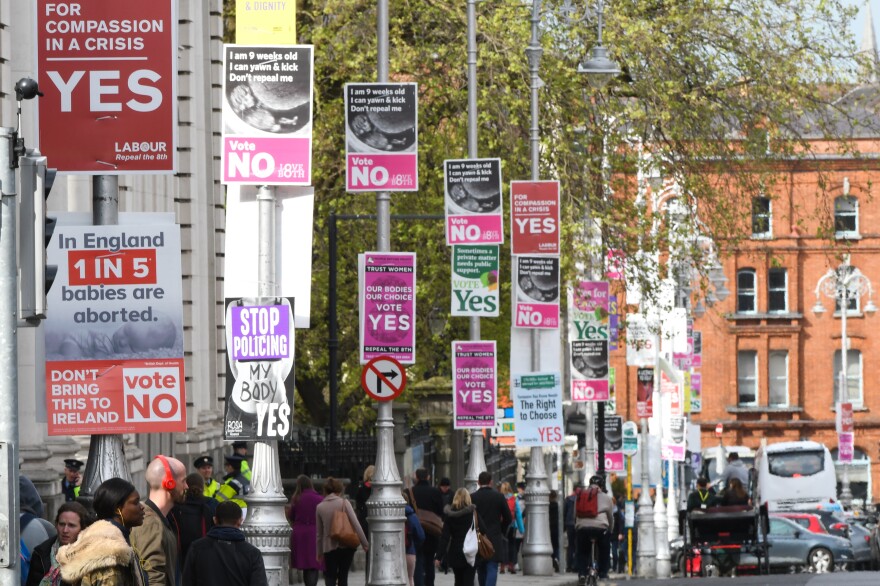On a bright afternoon outside the elegant facade of Trinity College Dublin, students hand out flyers to passers-by urging them to vote in Friday's referendum to lift Ireland's constitutional ban on abortion in most circumstances.
"Please vote yes on Friday! Thank you! Please vote yes," chirp the students, who have big smiles and colored sweaters with "REPEAL" emblazoned across the front.
But despite the grins, they say campaigning has not been a wholly pleasant experience. "It's been very emotionally taxing," says Sinéad Clarke, 22. "People come up to you and say they hope you die." They have also cursed and called her "slut," and one tore up a poster.
The debate over whether Ireland should change its abortion laws, currently some of the strictest in Europe, has played out with bitter intensity on the streets of Dublin, in ferocious television debates, controversial online ads, via church pulpits and difficult family discussions.
More than 3 million people registered to vote in Friday's referendum, according to the Irish Examiner newspaper. If a majority of them choose yes, that would repeal a constitutional amendment recognizing the "right to life of the unborn." The government would then introduce a bill on abortion that would be debated in parliament. Health Minister Simon Harris told The Irish Times he would hope to be able to pass such a bill into law by the end of the year.
Polls a week before the vote showed the "yes" side ahead, but its lead had narrowed from earlier surveys — and a significant group remained undecided.
Since the 1990s, historically socially conservative Ireland has changed. The country has legalized easier access to contraception, divorce, homosexuality and same-sex marriage. But the acrimony of the abortion debate highlights that for some people, this feels like a very different issue.
"I'm very proud to be part of this new Ireland," says medical doctor Andrew O'Regan. "I'm part of this progressive generation, a lecturer in university and I'm surrounded by university students every day." Yet he is campaigning to keep abortion laws as they are — with the procedure available only in cases when a woman's life is in danger.
"Human rights extend to everybody, not just the strong," he says. "The most weak and the most voiceless are the babies in the womb."
Many "no" campaigners have made compassion their theme. A spokeswoman for the LoveBoth campaign group, Geraldine Martin, says Ireland's health minister should give more financial support to women who might end a pregnancy because they cannot afford to raise a child.
Thousands of Irish women travel abroad to have abortions, or take illegal abortion-inducing drugs, each year.
"We've all known women who felt that they've no other options," Martin says. "We've all known women who've felt vulnerable and lonely."
But for all the emphasis on compassion, the "no" campaign's opponents say they are tainted by association with the body that has been most insistent on keeping abortion illegal, the Roman Catholic Church.
"The treatment of women outside marriage in Ireland over decades was really brutal," says Ursula Barry, a sociology professor at University College Dublin.
Last century, many unmarried mothers ended up in church-run homes or in laundry factories where they were forced to work without pay. Their babies were often given up for adoption.
"So there's all that background," says Barry, "when you're looking to disentangle the discussion and debate around abortion in Ireland. There's all that history of fear and stigma and shame and marginalization."
Investigations into the forced clothes-washing factories, called the Magdalene Laundries, and other abuses perpetrated by Catholic clergy, including child abuse, have eroded the credibility of and support for the church in this largely Catholic country.

That shift means the atmosphere now is very different from the one in which the eighth amendment to the constitution was implemented, also after a public referendum.
Abortion in Ireland was already illegal long before the amendment, but America's landmark Roe v. Wade decision in 1973, which made abortion available in the United States, raised concerns among Catholic groups. Seeking to avoid similar legislation in Ireland, campaigners pressed for a constitutional amendment to firm up the country's legal provisions against abortion.
Una Mullally, an author and abortion-rights campaigner, says she sat down one day with her parents and asked them how they voted in 1983.
"And they said that they voted for the eighth amendment, which I kind of guessed, I suppose," she says. "My dad was a religion teacher for 40 years; my mum grew up in East Galway." Especially in rural areas, the Catholic Church's stance was everyone's stance.
But Mullally, 34, says that over her lifetime, she has seen the influence of the church wane dramatically, including over her parents.
"What's been emotional for me actually is my parents are voting for repeal. And my mum is canvassing," she says. "And seeing them really address what they were told and challenging that as pensioners has been very powerful."
Copyright 2021 NPR. To see more, visit https://www.npr.org.





